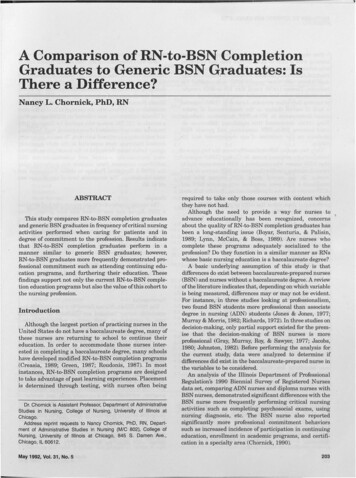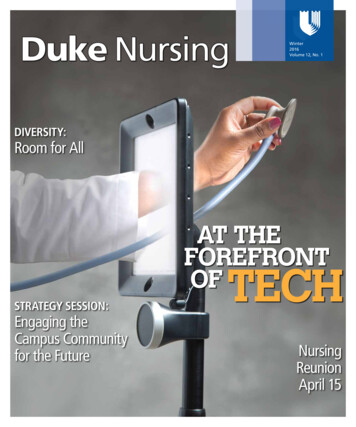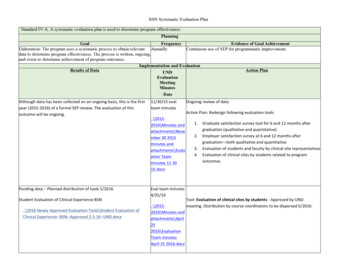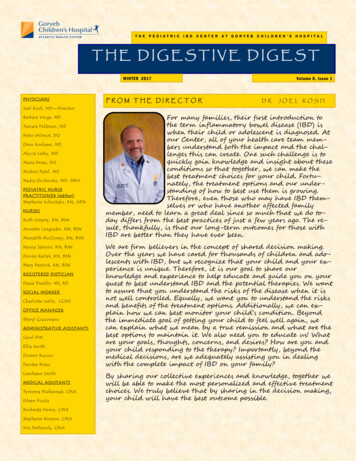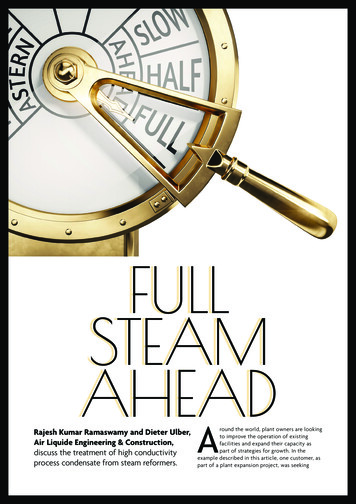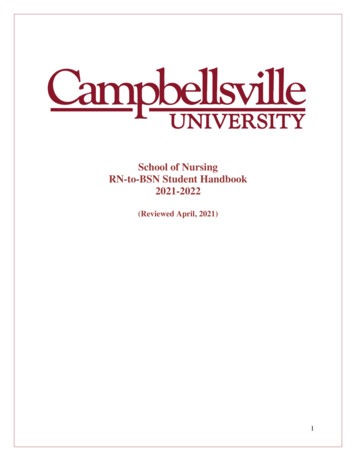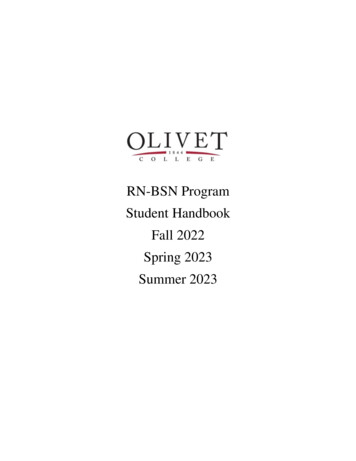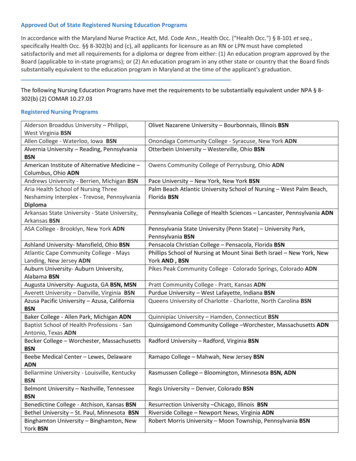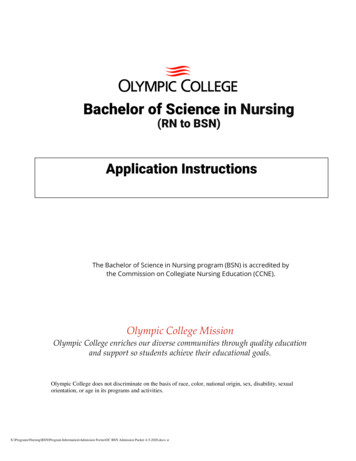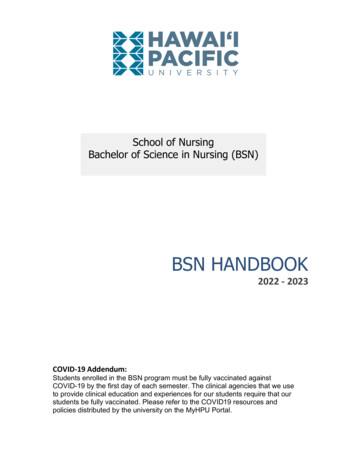
Transcription
School of NursingBachelor of Science in Nursing (BSN)BSN HANDBOOK2022 - 2023COVID-19 Addendum:Students enrolled in the BSN program must be fully vaccinated againstCOVID-19 by the first day of each semester. The clinical agencies that we useto provide clinical education and experiences for our students require that ourstudents be fully vaccinated. Please refer to the COVID19 resources andpolicies distributed by the university on the MyHPU Portal.
BSN Student Handbook2022 – 2023Hawai’i Pacific UniversitySchool of NursingRevised 4/2022Table of ContentsABOUT THIS HANDBOOK . 5ACCREDITATION . 5LETTER FROM THE DEAN . 6NURSING ORGANIZATIONAL CHART . 7SCHOOL OF NURSING DIRECTORY . 8MISSION, VISION & VALUES . 9Hawai’i Pacific University . 9School of Nursing . 9BSN PROGRAM LEARNING OUTCOMES, CONCEPTS & DEFINITIONS . 11STANDARDS & REQUIREMENTS OF THE BSN STUDENT . 11Essential Skills & Abilities . 11ANA CODE OF ETHICS . 12ANA STANDARDS OF PRACTICE & PROFESSIONAL PERFORMANCE . 12The Standards of Practice . 12The Standards of Professional Performance . 12CLINICAL COURSE POLICIES & PROCEDURES. 15Clinical Facilities . 15Clinical Preceptorships . 15Community & Home Visitations . 15Background Check . 16Transportation to Clinical Facilities . 162
Clinical Orientation . 16Maintenance of Confidentiality . 16Social Media & HIPAA Policies . 17Clinical Registration . 17Clinical Attendance . 17Illness or Injury in the Clinical Setting . 19Clinical Health Record & Documentation Requirements. 19Castle Branch & Getting Cleared . 19What to Submit . 21Deadlines . 22Appearance Standards . 22ACADEMIC POLICIES & PROCEDURES . 23Grading Policy . 23Grade Point Average (GPA) . 24Progression in the Nursing Major for BSN Students . 25Nursing Program Probation Policy . 25Clinical Course Grading . 26Clinical Skills Policy . 26Medication Calculation Competency Policy . 26Test Preparation Program Policies: Kaplan Nursing . 28Attendance Policy . 30Student Code of Conduct . 30Academic Integrity . 30Academic Warning . 30Unacceptable Practice. 31Course Withdrawal/Course Drop . 32Withdrawal from the University and/or Nursing Major . 33Leave of Absence . 33Dismissal from the BSN Program . 33Student Problem Resolution System. 33RESOURCES FOR STUDENT SUCCESS . 34Faculty Mentor Program . 34HPU Academic Advising . 36Counseling & Behavioral Health Services (CBHS) . 343
Accessibility Services . 34Tutoring Services. 35Military Service Member Support . 35International Student Support . 35HPU Library Services . 35Experiential Simulation Center (ESC) . 35Transcultural Nursing Center (TNC). 36Student Nurses Association (SNA) . 36Balancing Life as a Nursing Student . 37STUDENT RESPONSIBILITIES . 39Communication . 37Change of Name and/or Address and/or Phone numbers . 38Program Evaluation & Quality Improvement . 38School of Nursing Committees – Student Participation . 38Letters of Recommendation. 38HONOR SOCIETY . 39Sigma Theta Tau International Nursing Honor Society (STTI) . 39END OF PROGRAM EVENTS . 39Pinning Ceremony & Committee. 39University Graduation . 40Hawaii State Board of Nursing Regulations for Licensure and Certifications. 40NCLEX-RN Exam . 40APPENDICES . 44Appendix A: Use of Social Media by School of Nursing Students . 42Appendix B: HIPAA POLICY. 43STUDENT VERIFICATION FORM . 44Student Copy . 46Department Copy. 464
ABOUT THIS HANDBOOKThe BSN Student Handbook is a guide to the policies and procedures that Bachelor of Science in Nursing (BSN)students will need to know as they journey to obtain an HPU BSN degree. This handbook is supplementary tothe Hawai’i Pacific University (HPU) Student Handbook. The data contained within reflect current policies and maybe subject to modification. The HPU School of Nursing reserves the right to change any of the policies, rules,regulations, and standards at any time as may be necessary in the interest of HPU and the School of Nursing andalso reserves the right to modify, add, or discontinue any of the services, programs, or activities described in thispublication. The BSN Student Handbook is updated on a continual basis. Students are advised to access the mostcurrent handbook on the Nursing Pipeline Group and to carefully read any updates provided via email and/orhandouts in class.For HPU information, policies, and procedures in general, please refer to the HPU Catalog and academicmaterials.Please also refer to The Hawai‘i Pacific University’s Student Handbook which is available online andbook.pdf and on HPU Pipeline.ACCREDITATIONWASC – The Accrediting Commission for Senior Colleges and Universities of the Western Association of Schoolsand Colleges (WASC) has fully accredited Hawai’i Pacific University.Address:Western Association of Schools and Colleges985 Atlantic Avenue, Suite 100Alameda, CA 94501(510) 748-9001State – The School of Nursing of Hawai’i Pacific University are approved in accordance with the laws andregulations of the state of Hawai’i.Address:Hawai‘i Board of NursingDCCA, PVL Licensing335 Merchant Street, Room 301Honolulu, HI 96813(808) 586-3000ORHawai‘i Board of NursingDCCA, PVL LicensingP.O. Box 3469Honolulu, HI 96801CCNE – Accreditation by the American Association of Colleges of Nursing Commission on Nursing (CCNE) isvoluntary and serves as national validation of a quality educational experience in a given institution. TheBaccalaureate degree in Nursing, Master's degree in nursing, and post-graduate APRN certificate programs atHawai‘i Pacific University are accredited by the Commission on Collegiate Nursing Education. In 2017, the Schoolof Nursing received notice from CCNE of reaccreditation through 2027. The 10-year term is the maximumaccreditation that is awarded by CCNE.Address:Commission on Collegiate Nursing EducationOne DuPont Circle, NW Suite 530Washington, DC 20036-1120(202) 887-67915
LETTER FROM THE DEANWelcome to the School of Nursing at Hawai’i Pacific University.You will soon discover how very interesting your education will be. What you will learn in this program isessential for providing excellent nursing care to our patients and the public. As an added benefit, youreducation will also help you to personally live healthier lives and to better address any future health challengesthat you or your loved ones have. But, I must warn you that the nursing program is a serious and timeconsuming one. In fact, it is probably the most challenging, but rewarding, major here at HPU.As nurses, we have the unique privilege of helping patients and their families through very difficult times. Thisinvolves taking responsibility for providing the best care that you can. Therefore, please take advantage of theopportunities that we provide for you and learn all that you can while in class or clinical settings.We hope that you will leverage the remarkable civic and community engagement opportunities offered to youas nursing students to partner with our healthcare partners in creating healthy individuals, families, andcommunities. The world needs you and your extraordinary gifts and we are dedicated to facilitating thegrowth and usage of those gifts. To a world-class experience in the School of Nursing!Wishing you all the best as you embark upon your nursing career.Carolyn Yucha, RN, PhDInterim Dean and Professor6
School of Nursing Organizational Chart: Academic Year 2022DeanCarolyn YuchaAdministrativeAssistantLiane WongAssociate DeanBSN ChairJessica NishikawaJoelle PhillipsFulltime FacultyDirector of ClinicalCoordinationErica MonkOnline GraduateEducation ChairJennifer BaumstarkBSN Advisor*Simulation EducatorMyles YamamotoKristine SlagleOnline ClinicalCoordinatorDavid Smith*Simulation / Skills TechAdjunct FacultyDavid Symonnette7
SCHOOL OF NURSING DIRECTORYSON Administration & StaffCarolyn Yucha, PhD, RN, FAANInterim Dean of School of NursingJessica Nishikawa, DNP, NP-CAssociate Dean of NursingLiane Wong, BAAssistant to the DeansJoelle Phillips, DNP, RNBSN ChairpersonJennifer Baumstark, DNP, CNMGraduate Online Education ChairpersonDavid Smith, DNP, RNClinical Director of Graduate NursingErica Monk, MSN, FNPLecturer, BSN Clinical DirectorMyles YamamotoAdvisor, BSN studentsDavid SymonetteExperiential Simulation Center CoordinatorFull-Time FacultyApril Akeo, PhD, MSN, MBAAssistant ProfessorJoy Bliss, PhD, RNAssistant ProfessorPatricia Burrell, PhD, APRN, BC, CNEProfessorCheryl Castillo, BSN, RNClinical InstructorKelly Collins, PhD, RN, CNEAssistant ProfessorHazel Downing, EdD, RNAssociate ProfessorTandrea Jackson, FNP-BC, DNPAssistant ProfessorLeeah Javier, DNP, RNAssistant ProfessorMichelle Higgins-Mahe, DNP, RNAssistant dutajackson@ hpu.edulnjavier@hpu.edumhigginsmahe@hpu.eduSally Miller, PhD, CRNP, FAANPAGACNP-BC, AGPCNP-BC, FNP-BC, PMHNP-BC, FAANPAssociate ProfessorKris Slagle, DNP, RNAssistant ProfessorJo Wakayama, MSN, APRN, FNP-BCLecturer; FNP-Program Coordinatorkslagle@hpu.edujowakayama@hpu.edu8
MISSION, VISION & VALUESHawai’i Pacific UniversityMISSION: Hawai‘i Pacific University is an international learning community set in the rich cultural context ofHawai‘i. Students from around the world join us for an American education built on a liberal arts foundation.Our innovative undergraduate and graduate programs anticipate the changing needs of the community andprepare our graduates to live, work, and learn as active members of a global society.VISION: Hawai‘i Pacific will be consistently ranked among the United States’ top 10 Western, independent,comprehensive universities, leveraging its geographic position between the Western and Eastern hemispheresand its relationships around the Pacific Rim to deliver an educational experience that is distinct among Americancampuses.VALUES: The faculty, staff, students and overall university community of Hawai‘i Pacific embrace the followingvalues as representative of the spiritual, ethical and philosophical principles that support our community as wellas of the aspirational ideals to which we collectively aspire. Expressed both in Hawaiian and English, they are asfollows:ALOHA: meaning hello, goodbye, love, kindness and grace, unity, humility, patience and waiting for theright moment. Within the Hawai‘i Pacific University community, it also stands for shared future/goals,collaboration, decisive, disciplined, culture of accomplishment and valuing university communities.PONO: meaning righteous, honest and moral and an energy of necessity. Within the Hawai‘i PacificUniversity community, it also stands for truth and ethics, trust and respect, civility, transparency, gratitude,acceptance and purposefulness.KULEANA: meaning responsibility and rights and concern for all interests, property and people. Within theHawai‘i Pacific University community, it also stands for sustainability, student focused, value added,academic rigor, state of the art, stewardship and shared governanceSchool of NursingMISSION: Hawai‘i Pacific University School of Nursing is committed to educating competent and caringprofessionals in the practice of health promotion and healthcare. Graduates are life-long learners and leadersdedicated to delivering holistic care in the spirit of aloha for a global community.VISION: The School of Nursing will be ranked in the top nursing and health science programs delivering a distincttranscultural healthcare educational experience.PHILOSOPHY: The philosophy of the School of Nursing is in harmony with the University’s mission and is based onthe metaparadigms of people, environment, health, learning, and nursing.People: We believe patient centered care incorporates respectful, compassionate, coordinated care based onpatient preferences, values, and needs. Our goal is to facilitate patient autonomy, independence, and selfdetermination in a quest to control their own health.9
Environment: We believe in creating an environment that supports cultural competence, collaboration, andcollegiality. We believe in empowering people by delivering health education and nursing care that enhanceswellness and quality of life. Our goal is to achieve health equity, eliminate disparities in healthcare and improvethe health of all.Health: We believe health is a state of complete physical, mental, and social well-being and not merely theabsence of disease. Nursing focuses on the optimization of health throughout the lifespan. We believe there areindividual and cultural variations in health and health care. We believe health is a personal responsibility and allindividuals have the right to quality health care and/or end of life care.Learning: The faculty believes that learning is a collaborative effort between teacher and student with therecognition that learners are unique with individual learning styles, abilities, and goals. Students are responsiblefor their learning and must demonstrate honesty, integrity, and accountability.Nursing: We believe nursing to be a caring profession exemplifying collaboration, honesty, and integrity. Basedon evidence-based practice and cultural competency, nursing promotes optimization of health, prevention ofillness and injury, and advocacy in the care individuals, families, communities and populations. Within a holisticworld view, nurses use critical thinking and ethical considerations in collegial relationships with other professions.BSN PROGRAM LEARNING OUTCOMES, CONCEPTS & DEFINITIONSBSN PROGRAM LEARNING OUTCOMESPLO ConceptsPerson-Centered CareTeamwork & CollaborationEvidence-Based PracticeThe BSN Graduate Will:Deliver holistic, equitable, compassionate, developmentally-appropriate, andculturally-sensitive nursing care.Collaborate and communicate effectively with individuals, families, andinterdisciplinary teams to improve healthcare outcomes.Integrate reliable evidence and other sources of knowledge to make sound clinicaljudgments and guide nursing practice.Quality ImprovementApply quality improvement principles for continuous improvement to the delivery ofperson-centered care.Information & HealthcareTechnologyUse evidence-based information and healthcare technology to assist in the provisionof safe, quality, person-centered care.SafetyProfessionalismLeadershipEmploy principles of safety-science to reduce the risk of harm to individuals,communities, and self.Demonstrate the inherent values, ethics, and behaviors congruent with the disciplineof nursing.Integrate leadership and communication skills into practice to facilitate positivehealthcare outcomes.10
PLO Concept DefinitionsPerson-centered care. The provision of compassionate, equitable, age, and culturally-sensitive nursing care that is basedon a patient’s physiological, psychological, sociological, and spiritual needs as well as preferences, values, and beliefs whichrespect the patient and designee to promote safe, quality care.Teamwork and Collaboration. The delivery of a coordinated approach to person-centered care in partnership with thepatient, other nurses, and interprofessional team members, fostering open communication, mutual respect, and shareddecision-making to achieve safe quality care.Evidence-based practice. The integration of best current evidence, clinical expertise, and patient involvement to makesound clinical judgments and guide nursing practice to achieve optimal person-centered care.Quality improvement. The use of data and improvement methods consistent with current professional knowledge andevidence to monitor outcomes of care processes for the continuous improvement of health care services.Information and Healthcare Technology. The design, development, use, and management of information science andtechnology as a communication and information management tool to direct care, mitigate error, and support clinicaldecision making and evidence-based nursing practice.Safety. The minimization of risk factors and errors of commission and omission that could cause harm to patient, self, orothers or delay patient recovery through individual, unit, or system performance.Professionalism. The demonstration of accountable and responsible behavior of the nurse and internalization of corevalues integral to the profession of nursing that incorporates legal and ethical principles and regulatory guidelines thatcomply with standards of nursing practice.Leadership. The process by which nurses act ethically to influence the behavior of individuals or groups of individuals usingprinciples and standards fundamental to the profession of nursing and that facilitate the establishment and achievementof shared goals.STANDARDS & REQUIREMENTS OF THE BSN STUDENTEssential Skills & AbilitiesA candidate for professional nursing must have the abilities and skills necessary to use the nursing process. Theseskills and abilities include observation, communication, motor ability, conceptualization, integration andquantification, and behavioral/social acceptability. Technological compensation can be made for some disabilitiesin certain areas, but a candidate must be able to perform in a reasonably independent manner. The use of atrained intermediary is not acceptable, in that a candidate’s judgment must not be mediated by another’s powerof observation and selection.The following skills and abilities are necessary to meet the requirements of the nursing curriculum and toachieve the level of competence required for safe professional practice:11
ACCOMMODATION: Student accommodations are negotiated through the American Disabilities Act(ADA) through the ADA Coordinator of Academic Advising and Student Support. Please refer to HPU’sStudent Handbook which is available online or contact the Center for Academic Success at (808) 5449334.OBSERVATION: The candidate must be able to observe a client at a distance and close at hand.Observation necessitates the functional use of the sense of vision and somatic sensation, and is enhancedby the use of smell.COMMUNICATION: The candidate must be able to speak, to hear and to observe clients in order to elicitinformation; describe changes in mood, activity and posture; and perceive nonverbal communication. Acandidate must be able to communicate effectively, efficiently, and sensitively with clients, colleagues,instructors, professors and other health care providers. Communication includes speech, reading andwriting in the English language.MOTOR ABILITY: Candidates must have sufficient motor function to elicit information from clients bypalpation, auscultation, percussion, and other assessment maneuvers. A candidate must have sufficientmotor skills to gain access to clients in a variety of care settings and to manipulate the equipment centralto the treatment of clients receiving professional nursing care. Such actions require equilibrium,coordination of both fine and gross muscular movements, and functional use of the senses of touch andvision. Candidates must be able to tolerate physically taxing workloads including lifting and turningpatients (candidates must be able to lift 25 pounds or more).CONCEPTUAL, INTEGRATIVE, AND QUALITATIVE ABILITIES: The candidate must be able to problem solveusing the skills of measurement, calculation, reasoning, analysis, and synthesis. The candidate must beable to comprehend three-dimensional relationships and to understand the spatial relationships ofstructures.BEHAVIORAL, ETHICAL, AND SOCIAL ATTRIBUTES: Candidates must possess emotional health in order to:fully utilize their intellectual abilities; exercise good judgment; promptly complete all responsibilitiesattendant to the care of clients; and develop mature, sensitive, and effective relationships with clients,colleagues, instructors, professors and other health care providers. Candidates must be able to functioneffectively under stressful conditions. The candidate must be able to display flexibility and adapt tochange in the environment. The candidate is expected to learn to function in the face of uncertaintiesinherent in the clinical problems of clients. Candidates are expected to behave at all times in a legal andethical manner in school as well as the clinical arena. Candidates are expected to administer nursing carewith respect for the cultural values of their clients.The School of Nursing reserves the right to dismiss from the nursing major at any time a student who fails tomeet these essential criteria or whose health, work, or conduct dem
BSN Student Handbook . is a guide to the policies and procedures that Bachelor of Science in Nursing (BSN) students will need to know as they journey to obtain an HPU BSN degree. This handbook is supplementary to the Hawai'i Pacific University (HPU) Student Handbook. The data contained within reflect current policies and may
